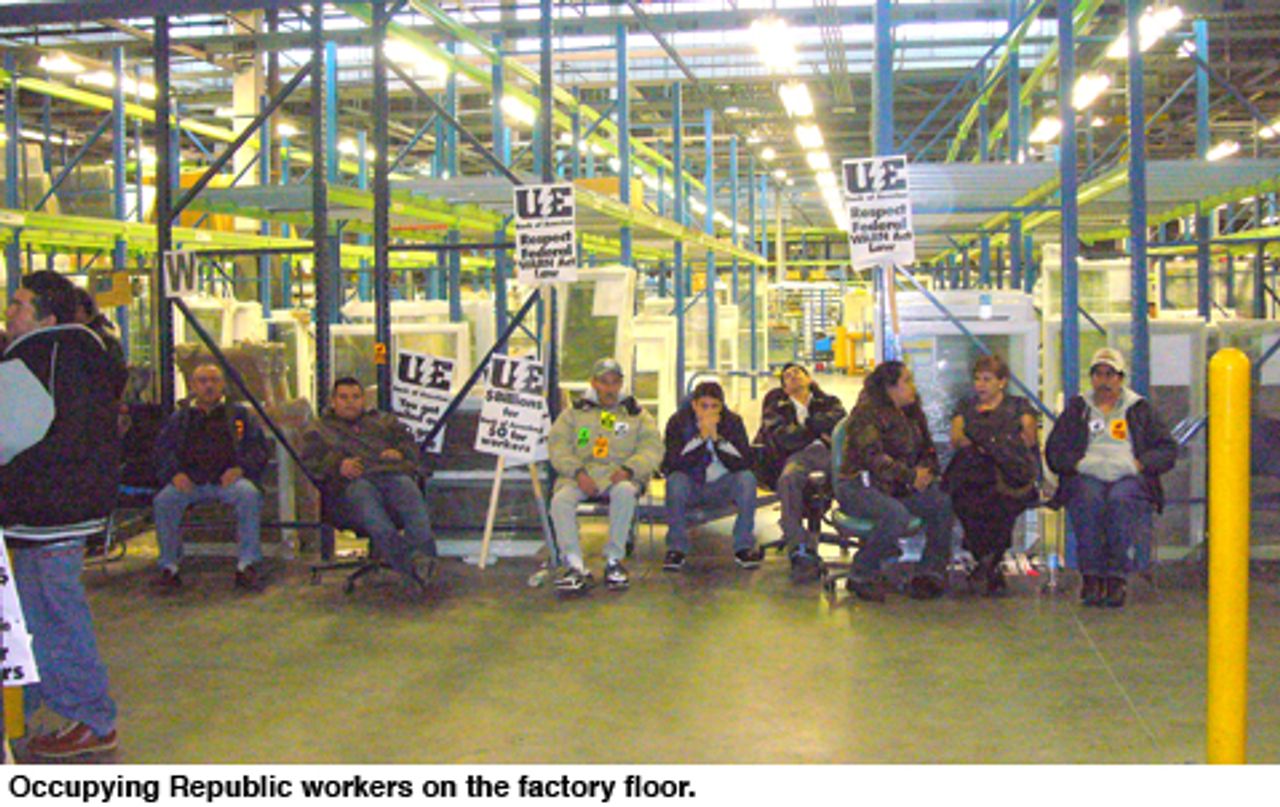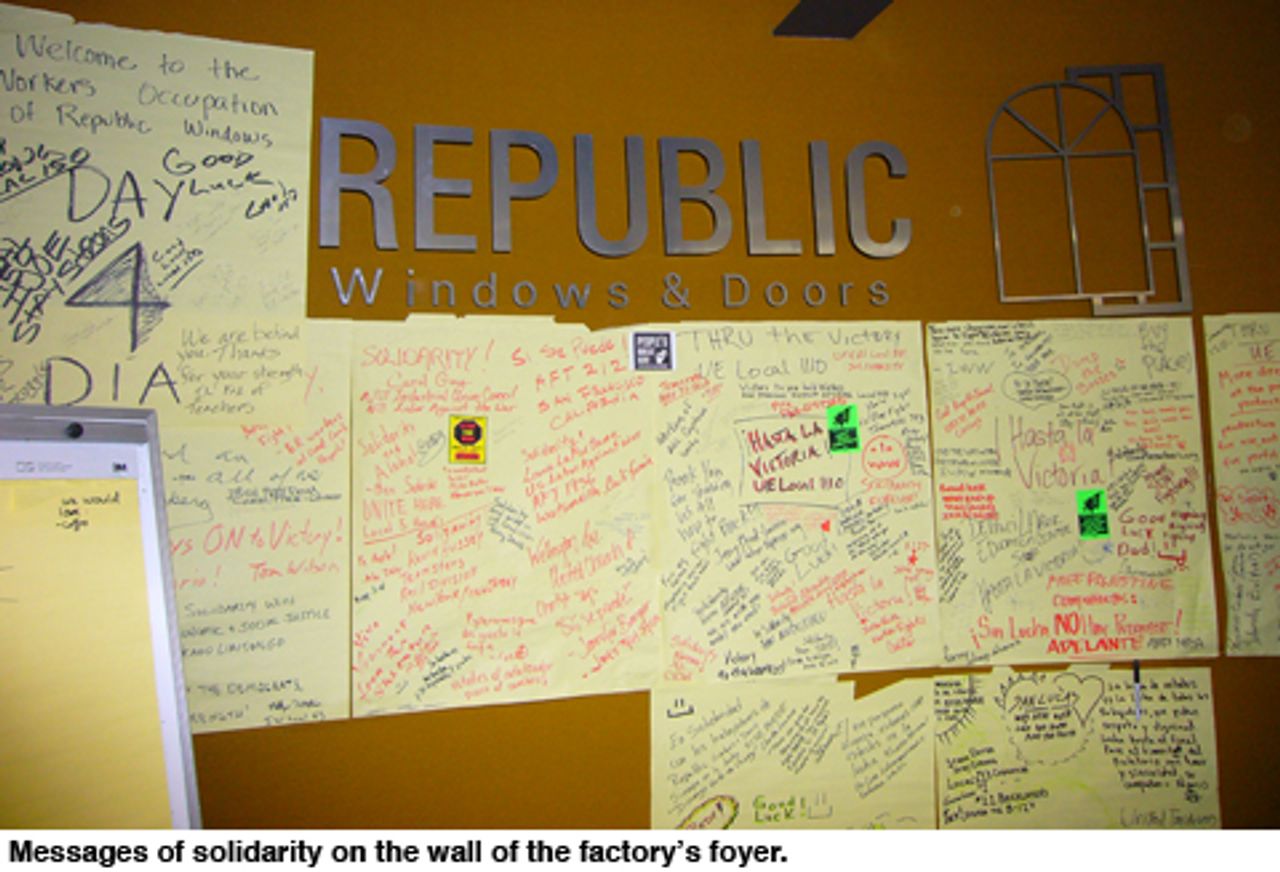 The occupation of the Republic Windows and Doors factory in Chicago by some 250 workers entered its fifth day on Tuesday. On December 2, workers were informed the plant would permanently close in three days and that they would be laid off. Workers are demanding severance and vacation pay as restitution for Republic’s violation of federal law, which stipulates that workers must be given 60 days notice prior to layoffs arising from plant closures. Republic claims that it cannot pay workers because Bank of America, one of its major lenders, had cut off its line of credit.
The occupation of the Republic Windows and Doors factory in Chicago by some 250 workers entered its fifth day on Tuesday. On December 2, workers were informed the plant would permanently close in three days and that they would be laid off. Workers are demanding severance and vacation pay as restitution for Republic’s violation of federal law, which stipulates that workers must be given 60 days notice prior to layoffs arising from plant closures. Republic claims that it cannot pay workers because Bank of America, one of its major lenders, had cut off its line of credit.
The struggle of the Republic workers has attracted widespread support. In the days since the occupation began, workers and students from Chicago and beyond have visited the plant, expressing their solidarity with messages of support and with donations.
As yet, no resolution has been reached. However, Bank of America (BOA) issued a statement on Monday, as negotiations continued, indicating that it was willing to make a loan of an unspecified size so that Republic could meet payroll. BOA said that it is “prepared to provide a limited amount of additional” loans and regretted “Republic’s failure to pay their employees the employee Claims to which they are legally entitled.”
However, the workers’ union, the United Electrical Workers (UE), issued a statement on its web site Tuesday reporting, “Bank of America informed us their statement from yesterday was released in error.”
Bank of America has been awarded a $25 billion taxpayer-funded bailout from the US government through TARP (Troubled Asset Relief Program), in addition to an undisclosed share of the some $4 trillion the Federal Reserve Board has handed out directly to major financial concerns.
Republic management had intended to close the plant since at least October. It had evidently begun to shift equipment and material to a non-union factory in Iowa, which borders Illinois to the West. Workers noticed that inventory items were not to be found in the plant, and they say that equipment was being hustled out in the dark of night. Republic says that its orders had fallen sharply in the past month. However, workers have expressed skepticism that the company was bankrupt. If it can demonstrate that its line of credit was suddenly cut off, Republic may not be technically liable for severance pay.
Republic is owned by Richard Gillman. Previously an investor in the company, Gillman bought Republic outright in 2006. Gillman has boasted that under his leadership Republic reduced its expenses by 47 percent and increased productivity by 30 percent, but claimed that the company has been punished by the collapse in the housing market.
A team of World Socialist Web Site reporters visited the occupied factory to speak with workers and those there to lend support. The factory is in an industrial zone on the northwest edge of Chicago’s downtown, a stone’s throw from the famous Cabrini-Green housing projects and the distribution center of the Chicago Tribune, which just announced that it will file for bankruptcy protection.
At the factory’s entrance were several dozen workers, a giant inflatable rat—meant to symbolize Republic’s owners—as well as several vans belonging to news organizations.
Several workers told the WSWS that they were not allowed to talk to the media. Their union, the United Electrical Workers (UE), has limited media contact by selecting a handful of designated workers as spokesmen, and by allowing media access for only limited periods. Leah Fried, a full-time UE organizer, has positioned herself to handle most media questions, especially those from the national news media. In the late afternoon on Monday, workers were brought in from the occupation to stand behind Fried as she spoke to CNN.
Reporters were also not allowed to enter beyond an internal entryway to the production area itself, where some 30 workers sat in a semi-circle. This, reporters were told, was part of an arrangement worked out with Republic’s owners so that the occupation could continue.
 Shifts of occupiers passed in and out through the foyer. The workforce is largely Hispanic, but there are also a significant number of African-American workers employed at the factory. WSWS reporters were able to speak to several Republic workers, representatives of the UE, and supporters of the occupation from Chicago. (See: "Republic Windows and Doors workers speak on their struggle").
Shifts of occupiers passed in and out through the foyer. The workforce is largely Hispanic, but there are also a significant number of African-American workers employed at the factory. WSWS reporters were able to speak to several Republic workers, representatives of the UE, and supporters of the occupation from Chicago. (See: "Republic Windows and Doors workers speak on their struggle").
Workers expressed anger toward both Republic and Bank of America. They are acutely aware of and angry over the stark contradiction between the bailout of Wall Street and the mounting layoffs and deepening impoverishment facing workers. The Republic workers see their struggle as historic, and they sense that they are fighting for workers far beyond their factory’s walls.
The occupation at the Republic factory represents the first independent response of the American working class to the deepening economic crisis. By occupying the Republic factory, workers have struck at the holiest of holies of official US political life—the sanctity of private property and the capitalists’ dictatorship over production.
The example of Republic stands in sharp contrast to the response of the United Auto Workers bureaucracy to the threatened bankruptcy of the Big Three auto companies. The UAW has already indicated that “everything is on the table” in its bid to help resuscitate the profit margins of the major carmakers. This will include plant closures, mass layoffs, and savage wage and benefit cuts. All this the UAW has offered prior to negotiations and without so much as hinting at a struggle on behalf of the workers it nominally represents.
With the occupation unfolding in Chicago, autoworkers and other sections of the workforce now have a different example of struggle, one that recalls the sitdown strikes that brought about the unionization of the auto industry in 1937.
As for the perspective of their union leadership at Republic, it is limited to winning severance pay and does not extend to restoring the jobs of the workers being laid off. This limitation arises not from the workers’ struggle itself—which is courageous and unprecedented in recent US history—but from the trade union approach of the UE, which is demanding only that workers receive a “fair” dismissal and which is cooperating with the Democratic Party in an attempt to prevent broader political conclusions from being drawn.
To fight the destruction of jobs and plant closures, workers must arm themselves with a new political perspective independent of the two major political parties and the trade union bureaucracy, which together defend the profit system that has produced the current economic crisis.
Implicitly, the occupation of the Republic Window and Door factory poses the struggle for socialism. Industry and finance must be taken out of the hands of the capitalists and reorganized, the world over, in order to defend jobs and living standards and meet essential social needs.
Subscribe to the IWA-RFC Newsletter
Get email updates on workers’ struggles and a global perspective from the International Workers Alliance of Rank-and-File Committees.
